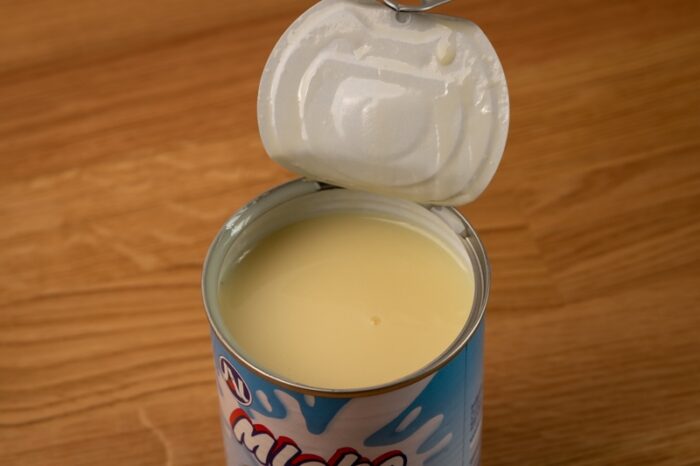You reach into the pantry for a can of evaporated milk to finish baking grandma’s chocolate pie recipe, but pause upon seeing the stamp reads “best by Aug 2022”. It’s now November. Safe to still use or is it time to toss the can? in this post we talk about Evaporated Milk After Expiration Date.
With milk products, safety risks increase the longer after the printed expiration date. However, some condensed and evaporated milk cans have more flexibility than fresh milk’s strict limits. Let’s unpack the shelf life details around this canned staple.
What is Evaporated Milk?
Evaporated milk refers to milk concentrated through heat removal of 60% of the water content. This thick, creamy milk gets sterilized and then sealed in cans for prolonged storage without refrigeration.
The resulting vitamin-rich product contains higher levels of protein, calcium, potassium and carbohydrates compared to regular milk. Once opened, it requires refrigerator storage and lasts about a week.
Unopened evaporated milk held at 40°F or below should maintain quality and safety for 5-7 days past its “best by” date. However, even unrefrigerated cans demonstrate impressive longevity if still sealed.
How Long Does Sealed Evaporated Milk Last?
Contrary to refrigerated fluid milk, the UHT pasteurization and hermetic canning enables evaporated varieties to withstand ambient temperatures quite well.
The FDA dictates milk processed this way remains consumable for a minimum 12 months when stored below 90°F. This one-year rule is reflected in most “best by” expiration stampings.
However, shelf life extends well beyond a year if storage conditions are favorable, regardless of “best by” dating. Evaporated milk’s typical longevity when kept sealed is:
– 1 week after opening (refrigerated)
– 2-3 weeks past date (refrigerated)
– 4-8 months past date (room temperature)
– 1-2 years past date (controlled room temp)
So evaporated milk cans often deliver much later expiry leniency versus fresh milk needing use within 5-7 days of opening. Let’s explore what factors influence shelf life for this canned product.
Storage Temperature Impact
Ambient storage temperatures make a significant difference in evaporated milk safety even when sealed. While the cans allow storage at room temperature, excessive heat degrades quality and hastens spoilage risk.
Ideally, sealed cans should be stored at 50-70°F to maximize shelf life and quality. Temperatures exceeding 80°F rapidly accelerate nutrient degradation along with flat or “tinny” flavor development.
For each 18°F increase above optimal 70°F storage, the opened milk shelf life gets cut in half. A sealed can may last 2 years at 55°F controlled room temp, but just 4-6 months if left in a hot garage at 90°F. Refrigeration always prolongs safety so use it once open.
Can Integrity Rules
Another determinant of evaporated milk safety is container integrity itself. As long as cans remain vacuum sealed with no punctures, swelling or leakage, the sterilized contents stay protected against microbial invasion for long stretches.
Slight can dents don’t automatically deem contents unusable if seals remain intact. However deep inward deformations should get discarded since seam issues may allow air ingress and raise contamination risks. Never consume from a bulging or leaking can.
What Happens Over Time
While unopened evaporated milk stays consumable months beyond the date, deterioration still slowly occurs. Nutrient levels gradually decline along with some separation of milk solids from liquid. Flavor progressively fades or turns stale/metallic without proper temperature control.
These diminishing quality traits remain subtle though and don’t necessarily pose safety issues as long as cans haven’t been compromised. Separation can be mitigated by stirring contents after opening.
Pay attention for further warning signs of spoilage like sour odor, curdling, mold or extreme discoloration which would all warrant discarding the can.
When to Toss Unopened Cans
Assuming cans are stored sealed at reasonable room temperatures, start observing cans closely as you near the 2-year mark from production, even if no exterior corrosion or damage.
Safety indicators to watch for include:
– Bulging ends indicating gas buildup
– Misshapen, dented or swollen condition
– Rust, leaks or pinholes along seams
– Mildew, sliminess or stickiness on exterior
Immediately discard any cans exhibiting these traits! Don’t risk botulism poisoning from swollen cans. Mold growth likewise confirms internal microbes are present so should get thrown out promptly.
Tips for Extending Life
To maximize evaporated milk’s usable life, follow these handling tips:
– Select cans without dents or seam defects
– Store sealed cans in a cool, dry kitchen pantry area away from heat sources or temperature fluctuations
– Keep storage temperatures moderate – between 50°F and 70°F is ideal
– Write the purchase date on cans with marker to track age
– Refrigerate promptly after opening and use within 5-7 days
– Don’t freeze unopened cans more than 1 month or it affects texture
Properly stored in controlled room temperature conditions, unopened evaporated milk stays usable for up to 2 years beyond any “best by” date while retaining its labeled nutrition content. Gradually declining quality doesn’t automatically mean safety risks if cans haven’t been compromised.
Once open, limit refrigerator storage to one week maximum just like fresh milk. So when it comes to baking that chocolate pie, assess your can’s condition but don’t feel you need to automatically trash older evaporated milk as long as storage factors haven’t accelerated degradation. I hope this Evaporated Milk After Expiration Date post helps you.

